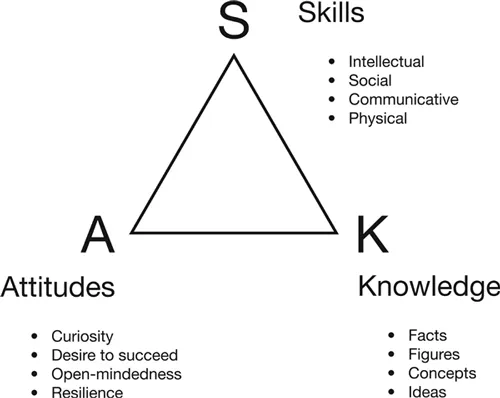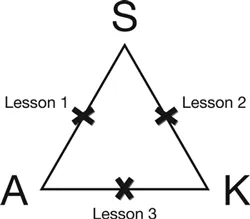![]()
Chapter 1
Learning how to learn
What’s the point of education?
What’s the point of education? I’ve been asked this a few times by pupils, a lot of times by adults who hated school and by more taxi drivers than I care to remember. My answer is always the same: to help children learn how to learn.
Of course this isn’t the only goal. Children also need to become numerate, literate, thoughtful and kind. They need to understand how to act morally, considerately and socially. And they should know how to be safe.
Yet the almost daily debate in media around the world is about what knowledge ought to be taught in school. Recent debates have included whether creationism should be taught alongside evolution theory or whether there’s a point to teaching PowerPoint when it’ll probably be outmoded within a few years. There have been suggestions that if Latin were still on the curriculum then we’d all be language experts and that if the army ran our schools there’d be less crime. I even read recently that some dog trainers are insisting all children be taught at school how to recognise whether a dog is about to bite or beg! As important a lesson as this might be, I wonder where it would fit into the school timetable. Perhaps between hieroglyphics and henna tattooing on a Friday afternoon, at the end of the 60-hour school week needed to accommodate the demands of every special interest group?
There is merit to the debates about which subjects children should study. After all, pupils have to study something so it is right and proper that we consider which subjects are the most important. Yet think of all the information you learned at school. How much of it do you use today? Indeed, how much of it has been superseded by changes in society? Is there any point teaching today’s children to map read, speak French, type on a keyboard, maintain a petrol-driven car (or even to drive)? If so, are these worthy enough to keep Mandarin Chinese, computer programming, or even dog whispering off the 25-hour weekly school timetable?
As a parent, I would like my children to learn French at school because I think learning other languages opens doors socially, emotionally and cognitively. However, if they don’t manage to – well, c’est la vie.
On the other hand, I’m not prepared to take such a relaxed view about learning how to learn. If my children leave school without a superb repertoire of learning capabilities, a willingness to inquire and innovate and the wisdom to make judicious decisions (as well as lots of knowledge), I would feel that I, and their schooling, had let them down.
Yet how many children do leave school discouraged and ill-equipped for the intellectual and emotional challenges of life? How many leave school with good grades achieved through memorising facts, who then go on to struggle at university or work where the emphasis is on independent thinking not regurgitation?
Before we all rush to drag our kids out of school, the good news is that learning strategies can be taught, attitudes can be encouraged, motivation can be strengthened and many schools are succeeding admirably in achieving these ambitions.
The key is to recognise the value and role that attitudes, skills and knowledge play in the learning process and then to ensure that children’s education involves a development of all three.
Here is where to start: A.S.K.
A.S.K
A.S.K stands for attitudes, skills and knowledge, which are made up of these key ingredients:
- Attitudes – positive attitudes towards learning, including curiosity and persistence.
- Skills – abilities to carry out those actions necessary for gaining understanding and achieving excellent performance in any given context.
- Knowledge – familiarity with information, concepts, theories and practices in a given field.
Figure 1.1 Developing attitudes, skills and knowledge
As a teacher in both primary and secondary schools, I used to plan lessons, set personalised goals for each pupil, and review learning with the help of the A.S.K model. I’d draw this as a triangle (below) to show that each lesson would emphasise two of the three dimensions of learning.
Figure 1.2 The A.S.K model triangle
Figure 1.3 The A.S.K model triangle
For example, when we began a topic about the Vikings (a common theme in UK primary schools), the first three lessons would be along the lines of:
Lesson 1: Exercise our curiosity (attitude of curiosity) to create as many relevant questions (skill of asking relevant questions) about the Vikings.
Lesson 2: Decide which of our questions about Vikings has the most relevance to our topic (skill of prioritising by value) and which will help us to know most about lifestyles (knowledge about the Vikings).
Lesson 3: Gain knowledge of Vikings (knowledge about Viking history) by persisting (attitude of persistence) with answering the questions we struggled to answer last time.
Over the next few pages, I have listed the skills and attitudes displayed by the best learners I have encountered. You can discuss them with children in a number of ways.
For example:
- Talk about the attitudes that have helped you succeed and those that have led to problems.
- When watching a sporting event together (even if that’s Strictly), draw attention to the competitors’ desire to win, to take risks, and to focus on the outcome. You can also talk together about the attitudes the performers must have drawn upon to attain their high degree of proficiency.
- Identify the actions people can take to demonstrate particular attitudes – for example, having one more try when you feel like giving up would demonstrate determination.
- Talk about the progress your children have made in developing their skills – for example, how much they have improved in bike riding, writing, playing the guitar and so on.
Poor is the pupil who does not surpass his master
(Leonardo da Vinci, 1452–1519)
If we don’t become better people from the education we gain, then what real purpose does education serve? If it is only to “earn” a living, then are we really “living”?
(Anon)
Attitudes for learning
S
K
Lev Vygotsky, one of the pioneers of educational psychology, wrote at length about cultural learning. He said children learn from those around them: what to laugh at, what to be afraid of, what to have a go at, what to avoid, and so on. He emphasised that children pick up mental, as well as physical, habits from their elders and warned us that the way we react to things is arguably more influential on young minds than the knowledge we share with children. In other words, children adopt many of our attitudes and values through dialogue with us. That’s one heck of a responsibility for those of us with children in our lives!
Of course, there is no hierarchy or exhaustive list of attitudes, at least not that I’m aware of, but here are some that are displayed by the best learners I’ve come across.
Outstanding learners are:
- curious;
- focussed on what is relevant;
- full of wonder;
- keen to learn from mistakes;
- open to new experiences;
- persistent;
- resilient;
- risk takers;
- self-regulating;
- willing to ask for support and coaching.
What (children) should learn first is not the subjects ordinarily taught, however important they may be; they should be given lessons of will, of attention, of discipline; before exercises in grammar, they need to be exercised in mental orthopaedics; in a word they must learn how to learn.
(Alfred Binet, 1909, founder of IQ testing)2
An attitude of self-control
In 1972, Stanford University psychologist Walter Mischel conducted an experiment to find out when the trait of deferred gratification – the ability to wait for something you want – develops in children. The experiment has been repeated many times since, including in the BBC series Child of Our Time.
The original experiment involved more than 600 children between the ages of four and six. Sitting in an empty room, the children were offered a treat of their choice – a cookie, a pretzel or a marshmallow. They were each told they could ...



